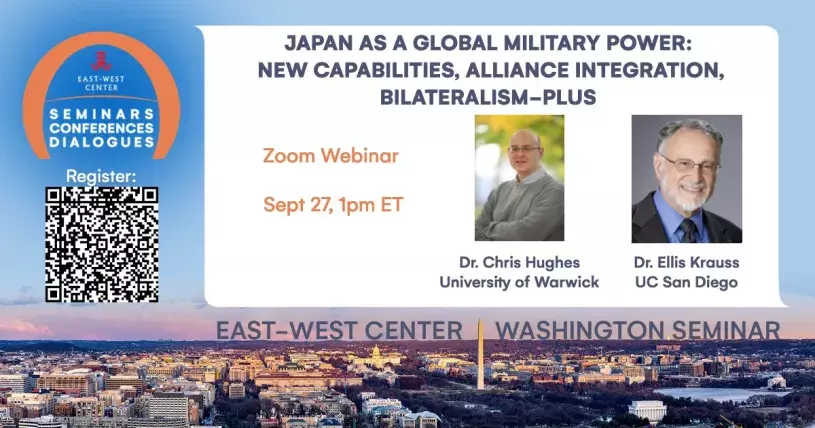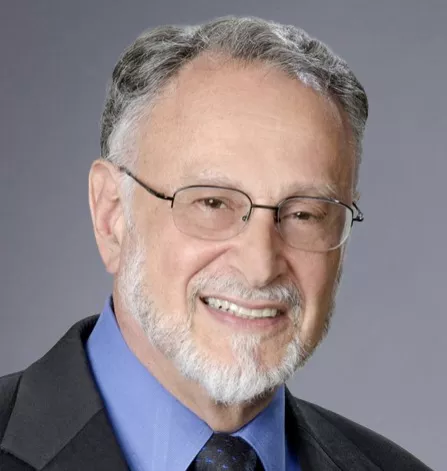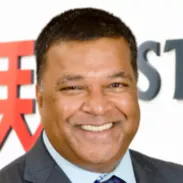Error message

OFFICE/DEPARTMENT
The East-West Center in Washington held an
Indo-Pacific Foreign Policy and Defense Series Webinar and Book Launch:
Japan as a Global Military Power:
New Capabilities, Alliance Integration, Bilateralism-Plus
A Conversation With:
Dr. Christopher Hughes
Professor of Japanese Studies and International Politics &
Pro-Vice-Chancellor/Vice-President (Education)
University of Warwick
Dr. Ellis Krauss (Discussant)
Professor Emeritus
School of Global Policy & Strategy
University of California San Diego
Dr. Satu P. Limaye (Moderator)
Vice President, East-West Center &
Director, Research Program and East-West Center in Washington
Japan is emerging as a more prominent global and regional military power, and in the process defying traditional categorisations of a minimalist contribution to the US-Japan alliance, maintaining anti-militarism, seeking an internationalist role, or carving out more strategic autonomy. Instead, this talk—based on a new book Japan as a Global Military Power (Cambridge University Press 2022)—argued that Japan has fundamentally shifted its military posture over the last three decades and traversed into a new categorisation of a more capable military power and integrated US ally. This results from Japan’s recognition of its fundamentally changing strategic environment that requires a new grand strategy and military doctrines. The shift is traced across the national security strategy components of Japan Self-Defence Forces’ capabilities, US-Japan alliance integration, and international security cooperation. The talk argued that all these components are subordinated inevitably to the objectives of homeland security and re-strengthening the US-Japan alliance, and thus Japan’s development as an international security partner outside the ambit of the bilateral alliance remains stunted.
Tuesday, September 27, 2022
1:00 PM – 2:00 PM ET
Click here to find your local start time.
SPEAKER BIOGRAPHIES

Christopher W. Hughes is Professor of Japanese Studies and International Politics and Pro-Vice-Chancellor/Vice-President (Education), University of Warwick, UK. He holds degrees from the University of Oxford, University of Rochester, and University of Sheffield; and has been a visiting professor at University of Tokyo, Waseda University, and Harvard University. He is author of Japan’s Re-emergence as a Normal Military Power? (2004, Oxford University Press), Japan’s Remilitarisation (2009, Routledge), Japan’s Foreign and Security Policy Under the ‘Abe Doctrine’ (2015, Palgrave) and Japan as a Global Military Power (Cambridge University Press, 2022).

Dr. Ellis Krauss is a leading expert on Japanese politics and U.S.-Japan relations. His research interests include Japan and the U.S. in Asia, Japanese foreign policy, domestic politics in Japan and the Japanese mass media. Dr. Krauss is a professor emeritus of Japanese politics and policymaking at the School of Global Policy and Strategy. In 2019, Brookings Institution Press published his co-authored book "Reluctant Warriors: Germany, Japan, and Their U.S. Alliance Dilemma." The book examines how and why Germany and Japan have modified their military postures since 1990 so far, and assesses how far the countries still have to go—and why.
After receiving his Ph.D. from Stanford University, Krauss was a visiting scholar at the University of Bologna, Italy and a visiting fellow at the Centre for the Study of Globalisation and Regionalisation at the University of Warwick, U.K. He has been a visiting scholar at several Japanese universities, and the Harvard University Program in East Asian Studies honored Krauss as their Distinguished Visitor for the 2014–15 academic year. In 2018 he received the Order of the Rising Sun, 3rd Class with Neck Ribbon for his professional accomplishments from the Emperor and government of Japan.

Satu P. Limaye is Vice President of the East-West Center and the Director of the East-West Center in Washington where he created and now directs the Asia Matters for America initiative and is the founding editor of the Asia Pacific Bulletin. He is also a Senior Advisor at CNA Corp (Center for Naval Analyses). He is a graduate of Georgetown University and received his doctorate from Oxford University (Magdalen College) where he was a George C. Marshall Scholar. He publishes and speaks widely on Indo-Pacific regional issues and supports various U.S. government, foundation, fellowship, and professional organizations. Among his current affiliations are Center for New American Security (CNAS) Task Force on the U.S.-Philippines Alliance, United States Institute of Peace (USIP) Senior Study Group on the North Pacific, Project 2049 Study Group on the U.S.-Australia Alliance, Korea Economic Institute (KEI) Advisory Council, and Global Taiwan Institute-Taiwan Asia Exchange Foundation project. Recent publications include: Southeast Asia’s choices: Economic, political, and geopolitical integration face complications, India in East Asia: Focused on the Quad and Border Disputes with China, and Maintaining the Technology Edge: Strengthening US and Indo-Pacific Alliances to Counter Chinese Technology Acquisition (with Rose Tenyotkin).
The East-West Center in Washington held an
Indo-Pacific Foreign Policy and Defense Series Webinar and Book Launch:
Japan as a Global Military Power:
New Capabilities, Alliance Integration, Bilateralism-Plus
A Conversation With:
Dr. Christopher Hughes
Professor of Japanese Studies and International Politics &
Pro-Vice-Chancellor/Vice-President (Education)
University of Warwick
Dr. Ellis Krauss (Discussant)
Professor Emeritus
School of Global Policy & Strategy
University of California San Diego
Dr. Satu P. Limaye (Moderator)
Vice President, East-West Center &
Director, Research Program and East-West Center in Washington
Japan is emerging as a more prominent global and regional military power, and in the process defying traditional categorisations of a minimalist contribution to the US-Japan alliance, maintaining anti-militarism, seeking an internationalist role, or carving out more strategic autonomy. Instead, this talk—based on a new book Japan as a Global Military Power (Cambridge University Press 2022)—argued that Japan has fundamentally shifted its military posture over the last three decades and traversed into a new categorisation of a more capable military power and integrated US ally. This results from Japan’s recognition of its fundamentally changing strategic environment that requires a new grand strategy and military doctrines. The shift is traced across the national security strategy components of Japan Self-Defence Forces’ capabilities, US-Japan alliance integration, and international security cooperation. The talk argued that all these components are subordinated inevitably to the objectives of homeland security and re-strengthening the US-Japan alliance, and thus Japan’s development as an international security partner outside the ambit of the bilateral alliance remains stunted.
Tuesday, September 27, 2022
1:00 PM – 2:00 PM ET
Click here to find your local start time.
SPEAKER BIOGRAPHIES

Christopher W. Hughes is Professor of Japanese Studies and International Politics and Pro-Vice-Chancellor/Vice-President (Education), University of Warwick, UK. He holds degrees from the University of Oxford, University of Rochester, and University of Sheffield; and has been a visiting professor at University of Tokyo, Waseda University, and Harvard University. He is author of Japan’s Re-emergence as a Normal Military Power? (2004, Oxford University Press), Japan’s Remilitarisation (2009, Routledge), Japan’s Foreign and Security Policy Under the ‘Abe Doctrine’ (2015, Palgrave) and Japan as a Global Military Power (Cambridge University Press, 2022).

Dr. Ellis Krauss is a leading expert on Japanese politics and U.S.-Japan relations. His research interests include Japan and the U.S. in Asia, Japanese foreign policy, domestic politics in Japan and the Japanese mass media. Dr. Krauss is a professor emeritus of Japanese politics and policymaking at the School of Global Policy and Strategy. In 2019, Brookings Institution Press published his co-authored book "Reluctant Warriors: Germany, Japan, and Their U.S. Alliance Dilemma." The book examines how and why Germany and Japan have modified their military postures since 1990 so far, and assesses how far the countries still have to go—and why.
After receiving his Ph.D. from Stanford University, Krauss was a visiting scholar at the University of Bologna, Italy and a visiting fellow at the Centre for the Study of Globalisation and Regionalisation at the University of Warwick, U.K. He has been a visiting scholar at several Japanese universities, and the Harvard University Program in East Asian Studies honored Krauss as their Distinguished Visitor for the 2014–15 academic year. In 2018 he received the Order of the Rising Sun, 3rd Class with Neck Ribbon for his professional accomplishments from the Emperor and government of Japan.

Satu P. Limaye is Vice President of the East-West Center and the Director of the East-West Center in Washington where he created and now directs the Asia Matters for America initiative and is the founding editor of the Asia Pacific Bulletin. He is also a Senior Advisor at CNA Corp (Center for Naval Analyses). He is a graduate of Georgetown University and received his doctorate from Oxford University (Magdalen College) where he was a George C. Marshall Scholar. He publishes and speaks widely on Indo-Pacific regional issues and supports various U.S. government, foundation, fellowship, and professional organizations. Among his current affiliations are Center for New American Security (CNAS) Task Force on the U.S.-Philippines Alliance, United States Institute of Peace (USIP) Senior Study Group on the North Pacific, Project 2049 Study Group on the U.S.-Australia Alliance, Korea Economic Institute (KEI) Advisory Council, and Global Taiwan Institute-Taiwan Asia Exchange Foundation project. Recent publications include: Southeast Asia’s choices: Economic, political, and geopolitical integration face complications, India in East Asia: Focused on the Quad and Border Disputes with China, and Maintaining the Technology Edge: Strengthening US and Indo-Pacific Alliances to Counter Chinese Technology Acquisition (with Rose Tenyotkin).








